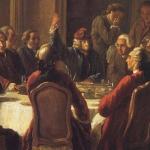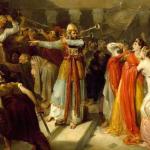Seizing power doesn’t make a revolution. When you seize speech, then you’ve got a chance at total revolution.
Writing of the French Revolution, James Billington writes (Fire in the Minds of Men, 34-5), ” four-letter outbursts of the youthful demonstrators in the late 196os echoed the political shock tactics of [Jacques-Rene] Hebert, who ‘. . . never began a number of the Pere Duchene without putting in a foutre or bougre. This gross vulgarity signified nothing but signaled . . . a total revolutionary situation [by using language] . . . to impose something beyond language which is both history and the part one is to play in it.'”
As Billington elaborates, “In a highly verbal culture linguistic shock was essential to the sustaining of the revolutionary spirit. The intimidating effect of aristocratic or academic speech had to be shattered by ‘. . . the seizure of the forbidden word, that which the established order proscribes because it destroys its legitimacy. The word which is both hidden and forbidden; the word which has been buried under accumulated generations of alluvial respectability.'”
Even the most substantive slogans of the Revolution were more “for incantation than explanation”: “The rational discourse of the philosophes was engulfed by a torrent of terminology created by intellectuals for plebeians, repeated in staccato shouts, and italicized or capitalized on fly-sheets and wall posters. Literate reformers of an earlier generation bitterly denounced the new ‘disposition to dominate conversation’ with idees forces, to profit from ‘the power of badly defined words,’ and to camouflage denunciations by using ‘on dit que . . .’ rather than ‘a precise and human nominative'” (38).
These moderates “recognized that the new journalists had found the secret of arousing the masses : ‘The people, burdened with their daily work, have neither the ability, time, nor desire to read. This enormous mass of people could never have been led into the terrible movement of these past three years by metaphysical, philosophical, or eloquent works. Other levels were needed. . . . not books, but words: liberty, tyranny, despotism'” (38).
















